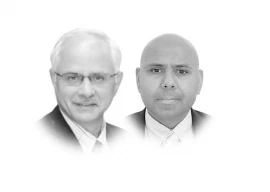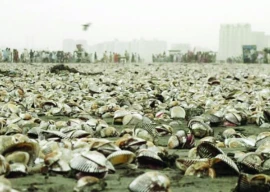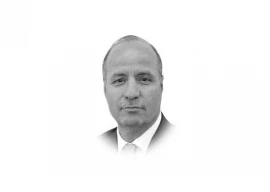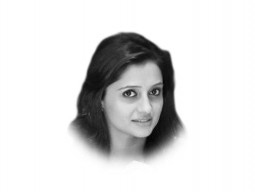
Still, with each act of violence on this soil which destroys the futures of innocent children, women and men, my hope wanes a little and my optimism recedes.
I imagine a young boy sitting in his family’s apartment in Abbas Town on the evening of March 3. His father has gone to the mosque to pray and he is putting the finishing touches on his homework while his mother prepares dinner.
Imagine his face, the surprise when that blast came out of nowhere and took his future away. Imagine his mother’s shock. Imagine the father who found everything he lived for literally blown up. One imagined face and life, and the heart shrinks.
Thinking of all those who died in Abbas Town, as well as the hundreds of Hazaras in Quetta this January and February, is almost unbearable.
Pakistan’s homegrown militants get more brazen by the day, striking marketplaces in Quetta during the evening rush hour and homes in the heart of the country’s most populous city. They attack where citizens are supposed to feel safest. But where are Pakistan’s leaders? Do they grieve each child, each man and each woman lost to this senseless violence?
They do not visit the affected areas until days after the attacks, if then. Do they look at each victim’s picture, not the one with blood and missing body parts, but at the picture of the happy eight-year-old, the face full of life? Do they bother to learn his or her name and what made the child special?
Does the thought that it could have been one of their own cross their minds? They must know it probably couldn’t, given the amount of security they receive. So, they remove themselves from the situation and hide behind aggregate casualty numbers and impassive condemnations of the attacks.
It is impossible that any well-meaning state can be this inept at protecting its own. As long as innocent citizens continue to be killed under its watch, the government’s condemnations mean nothing. A state’s foremost responsibility is protecting the lives of its citizens. How can cars get loaded with explosives and travel through the country’s largest city, through narrow streets, to arrive successfully at their target?
The ranks of the army and police far outnumber the terrorists responsible for these attacks. So, how can the militants be more adept than the state, time and again? How can the state refuse to take the name of the terrorist organisation, the Lashkar-e-Jhangvi, which took responsibility for the Quetta attacks? Why has its leader been arrested in Punjab on charges of hate speech, instead of suspected terrorism?
Where, you ask, is there room for hope in the midst of all this? The government has certainly failed us. My hope in Pakistan lies in its people. It lies in the Shia and Sunni survivors in Abbas Town helping each other out, in those donating blood to the injured, in the lawyers who declared March 4 a day of mourning for the attack, and in those collecting donations of money, food and supplies for the survivors.
In the Pakistan where I grew up, I never knew which of my friends were Shia and Sunni. I never knew whether one was Ahmadi, the other Kashmiri. We were all the same. In almost every way, we have regressed since then, but I can bet that the majority of children today still do not know which sect their friends belong to. Let’s not let that be overwritten by the hatred of a few.
I am not alone in thinking this way. Policy analysts, who know Pakistan well, continually cite the strength and intelligence of Pakistan’s people and its growing ‘civil society’ as the reason why Pakistan is unlikely to fail anytime soon. Pakistanis rally together after disaster strikes.
Following the 2005 earthquake in Pakistan’s north, they helped in recovery and relief efforts by generously donating time, food, supplies, money and medical expertise in the affected areas. They did so again following the debilitating 2010 floods.
So, when Pakistan emerges from this wave of senseless sectarian violence, battered but still intact, I will know who saved it. It will not be the army, nor the politicians, nor the judiciary. It will be the man on the street, who remains compassionate despite the most damning circumstances.
Published in The Express Tribune, March 10th, 2013.














COMMENTS
Comments are moderated and generally will be posted if they are on-topic and not abusive.
For more information, please see our Comments FAQ